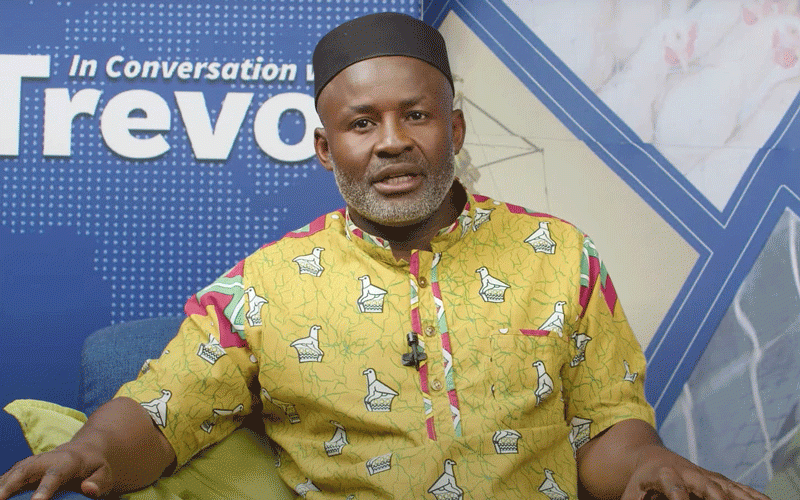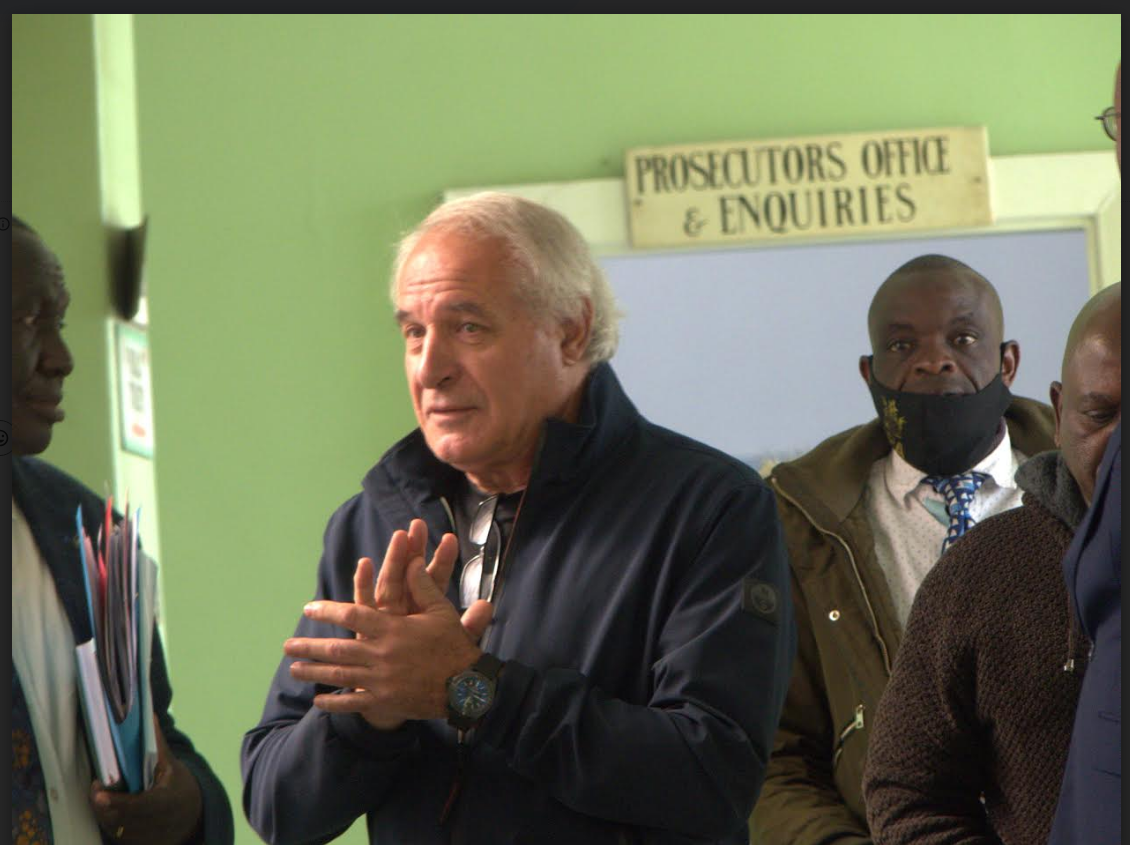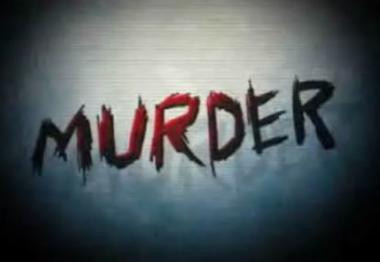
Independent legislator Temba Mliswa says President Emmerson Mnangagwa’s government has failed to live up to expectations following the coup that toppled long-time ruler Robert Mugabe in 2017.
Mliswa (TM), who is the MP for Norton and a vocal supporter of the military putsch, told Alpha Media Holdings chairman Trevor Ncube (TN) on the platform In Conversation with Trevor that Mnangagwa’s regime has “betrayed the people of this country” by failing to fulfil promises made during the coup.
Below are excerpts from the interview.
TN: Temba Mliswa, welcome to In Conversation With Trevor.
TM: Yes. And before I proceed, on a point of order Mr Speaker Sir, my name is Temba Peter Mliswa.
Temba meaning trust. I am the first boy in the family, and Peter the Rock in the Bible.
Muyera Shumba, Soko-Ncube on paternal side of my grandmother, and on the maternal side Moyo ndiSekuru, Nyathi is where my mother came from.
TN: You are my muzukuru hey?
- In Conversation with Trevor: Chisamba: Let’s be proud of ourselves
- In Conversation with Trevor: ‘I tried to change Zanu PF from within’ – Margaret Dongo
- In Conversation with Trevor : How car crash changed my life
- In Conversation With Trevor: ‘We lost our humanity’
Keep Reading
TM: Yes indeed.
TN: Peter I discovered is your Dad, and was an ex-combatant? Talk to me about your Dad Peter?
TM: My father left this country; born in Shurugwi, my grandfather was a village head and went to the same school with Tongogara, Gamwa area, and worked a lot with Zapu.
In fact, from what most of the ex-combatants tell me, especially the late S.K. Moyo, and the current ambassador Mutinhiri, was that he (my Dad) was well-liked and favoured by the late Joshua Nkomo, and after the struggle he decided not to be involved in politics.
He then worked at Zimoco, which was owned by Tiny Rollins' Lonhro in those days, so he preferred to do that.
He was very active in terms of supporting a lot, not only that but funny enough he also used to accommodate Robson Manyika, because Robson Manyika’s eldest brother, the late James Manyika who's the father to James was married to my father's sister...
TN: All right.
TM: Yeah. Tete Margaret.
So he did accommodate them as well.
So, it was a family which was exposed to a number of liberators of this country, and Zambia was very kind to Zpra as you know it, was up with a strong relationship and as a result we were all born there, we only came back to this country after in the independence.
TN: The place that you occupy Temba is an interesting one.
Independent, not a member of Zanu PF, you were kicked out of Zanu PF and so forth.
Talk to me about that space before we discuss your leaving Zanu PF?
What is it like being in that space? Not belonging to the opposition per se? Not belonging to Zanu PF? Talk to me about that space?
TM: My major agenda for going into politics was for our generation to be represented.
I sat down with my friends whom I grew up with, and said I would like to go into politics and they were against it.
They said you cannot, it is dirty, there is fighting, there is violence, and I said it is not about that.
It is about us as a generation taking a position, being in the corridors of power, and that is the only way we can build the country.
They said good luck if you are going to make it, and I did get into politics myself, because from a generational point of view I saw a gap.
What also prompted me to make that decision was that your generation and many others did not want to be involved in politics. I must be very clear.
TN: Yeah.
TM: You actually let us down, your generation let us down, because you were supposed to pass the baton to us, but we never saw it coming.
We were busy waiting for it but it did not come, and I said no, we need to go and grab it ourselves, we need to be part of this, and pass it to another generation, which I believe is critical for any nation to grow, because a certain generation has a certain understanding of things as they evolve, as things change. You know there is the digitalisation happening, the ICT world.
So how do you fit into the global village when you have a generation, which was never exposed to that.
So it was about also speaking to the truth, being honest and being able to represent people.
Zanu PF ideology remains critical for any Zimbabwean, but at the same time you know you cannot also go against your ideology. I was involved in sport as you know, and I was well supported by the government in making sure that the white- dominated sports like cricket and rugby would go back to the whites and that government was very supportive...
TN: Go back to the black people rather?
TM: Yes. It was pro-black, because the whole idea is that how then do we get the blacks to be part of this minority sport?
So, in a way I took a decision to have knowledge so that I could impart it on to the people in the high-density areas.
I did not see a white man being able to go there, it would have been difficult, they would be misunderstood, they would have difficulties even pronouncing the names of the people, which ultimately does not make somebody feel well.
So, I decided to cover that and from a sporting perspective we went on to do that.
Sport in a way drove me to the person I am, in that it builds your character at the end of the day.
Rugby is one-character building sport, after tackling each other so hard which is the only sport where you see true gentlemen who drink together, eat together and there is no bitterness.
I always say soccer players have a lot to learn from these rugby players.
I see them trying to fight, but rugby players who have the muscle, who have everything do not fight, they respect each other.
TN: How is that sport translated into politics into where you are right now because I see you throwing stones, not stones per se, I see you arguing, debating with the people in Nelson Chamisa’s party.
I see you debating with people in Zanu PF. How is that space politically? How do you survive in that space when you do not belong to the big two homes?
TM: You know I was expelled from Zanu PF, and regrettably for misinformation to the president then, when we were called the Gamatox, we were supposedly a cabal which was being led by Cde Joice Mujuru and many other senior members.
I remember nine chairpersons were expelled out of 10 through lies.
I remember going to my uncle Didymus Mutasa saying were you part of the meeting, you were expelled?
He said yes. I said but why did you allow it to happen because you know it is not true, could you not all sit down.
TN: Was he not expelled?
TM: Before he was expelled yes.
I said but could you not sit down and talk about it?
And how did you allow Rugare Gumbo to really be expelled and to leave the party and you are comrades, you are together?
Could you not stand up and defend?
He told me he was shocked, it was the first time he was in shock, he did not see it happening, and as a result he kept quiet, he only remembers Rugare Gumbo walking past him leaving the politburo meeting shaking his hand and saying “Ndaenda Nyathi” on his way out from the politburo.
But I said why could you not?
I then realised we did not have people who were prepared to serve this country by being honest. I was expelled.
I stood in Hurungwe West which was a violent election, I did not want to campaign because people were being beaten up, and there was violence which the Zimbabwe Human Rights Commission reported on and said that they had never seen such violence.
There are recommendations which they came up with, then I was chairman of Mashonaland West Province myself.
Then I stood (for Parliament) in Norton. In Norton itself the war veterans themselves were supportive of me.
TN: Because you were an independent?
TM: Yes, I was an independent. I got in, and won the constituency in Norton as an independent, and I actually said it was a blessing in disguise because I could then really be who I am and say the truth and put national interest first, and that's where I think it is the most advanced way of dealing with issues; is to talk about what is happening, to inform people and to stand for what is good for the country.
You now totally separate yourself from party politics, which people believe is more important than national politics.
I have always said to my colleagues the country is first, the political party is not first, the country is first then...
TN: Do you think people get that…the country first then the political party second?
Do you think Zimbabweans get that bit? In the opposition….in the ruling party?
TM: No they do not sadly. 43 years after independence we have an electorate which does not understand politics, which wants to stay away from politics.
Business wants to stay away from politics, but decisions that politicians make have a bearing on you.
I have always said to my colleagues in the private sector, if it is agriculture, if it is in engineering, how many candidates have you sponsored who will do what you do?
Who will advance you from an intellectual point of view…from an understanding of issues?
TN: What response do they give you? I mean that is an important question to businesses.
TM: They are still, you know, in this era of being intimidated, they are scared, and they do not want to talk about it.
TN: Zimbabwean business is scared about politics?
TM: And not only that, they are so dishonest that’s why they do not want to be open about it they still give money to the political parties quietly.
You do not have to give money to the political parties quietly.
TN: Both the ruling party and the opposition?
TM: Yes. They know that the government of the day will give them business, and if they are seen to be talking to the opposition there is a problem, which is something which I think is sad.
TN: What do you think is the effect of that on our governance system?
The timidity of the private sector to stand up to principles and values?
I mean I will take you to South Africa; South Africa changed because Anglo-American decided that they would talk to the ANC even during apartheid.
So the business community has a big role to play in the governance and in our democracy. But what you are saying is that that is not what is happening?
TM: Business in Zimbabwe is full of hypocrites. They have not helped move this country forward economically.
You cannot ignore politics, you have got to be able to be talking to politicians.
Like you said, I know in South Africa the big companies who have the position of a vice president, but that vice president's job is to interact with government, with the politicians, because it is critical.
They actually have that office of a vice president who is responsible for that, but we do not have that.
But the decisions that are made by politicians, the laws which are passed in Parliament affect them.
So the question is that how did you contribute to this? And why then stay away and have a situation where your company closes down to the effect of the ordinary person who suffers?
TN: What if they push back and say no but if we support, rather we are scared that we will lose government business, government contracts?
TM: For me if it is about principles, morals and values, so be it.
Why should you be in a country and be in business at the mercy of a government?
You must be in business because the government sees your role in building it.
The corporates themselves must be able to be very clear with government that if there are certain laws that you are passing and are not conducive for a business to thrive we will certainly close.
I think during the Mugabe time business had got to that stage.
In the second republic I expect the second republic to be more accommodating, but it seems the second republic is on a cold war, which is even more dangerous.
TN: With the private sector?
TM: Ultimately human rights, private sector, and all that. Yet they must be embracing and saying this is the second republic, this is what will happen, do what you have to do promote your business.
TN: Why do you think Mnangagwa’s Government is on this cold war as you say?
TM: Because they came up with the mantra of Zimbabwe's open for business...
They came up with a mantra that would be inclusive, and they have not been able to do that and they have betrayed the people of this country.
17 November 2017 everyone world over supported the change which would see Zimbabwe being a better nation and in anticipation.
Is the anticipation what it is now? No. You have got people who have been persecuted for no reason.
- “In Conversation With Trevor” is a weekly show broadcast on YouTube.com//InConversationWithTrevor. The conversations are broadcast to you by Heart and Soul Broadcasting Services. The conversations are sponsored by WestProp Holdings.










